Juncker: if the EU does not invest in Africa, Africa will come to Europe

The President of the European Commission, Jean-Claude Juncker, speaking at the plenary of the European Economic and Social Committee today in Brussels, advocated a radical change of attitude by the EU towards Africa and the migration crisis, based on a plan of European investments in African economies, in almost total agreement with Italy's positions Precisely the lack of attention from the EU heads of state and government towards Africa, and the need to support the economies of the countries of origin and transit of migrants, is one of the reasons that prompted Prime Minister Matteo Renzi to protest the inconclusiveness of the Bratislava summit on 16 September last. "In Africa - Juncker said, taking up one of the main points of his speech "on the state of the Union" given on September 14 in front of the European Parliament in Strasbourg - there are 60 million refugees, many more than at the end of the second war world; they are unhappy people who put all their hopes in the EU's ability to welcome them. But we clearly cannot, as Michel Rocard (the former French prime minister, who passed away recently, ed) said, receive all the misery in the world ".
"On the Mediterranean border between Libya and Italy - recalled the president of the European Commission - there are 225,000 of these refugees waiting to cross the Mediterranean. This is not possible. Instead of doing charity and writing noble poems on the causes of immigration it will be necessary to act to spare millions of Africans the journey across the Mediterranean which very often ends badly". "Therefore - Juncker recalled - we, the Commission, have proposed extending the investment plan towards Africa. We are therefore launching a Juncker Plan for Africa which, if the Member States accompany it, what is not could mobilize 88 billion euros of investment in Africa". "If Europe does not invest in Africa - underlined the president of the Commission -, Africa will come to Europe. It is a prospect that does not scare me, but it is more intelligent to make those who are unhappy happier on the spot, rather than to invite them to cross the Mediterranean and then find themselves in a dramatic situation in Europe". "It will be necessary - continued Juncker - that we keep Africa in mind, a noble and in fact very rich continent, which has been martyred by the influence of certain multinationals and by non-African governments which make Africans increasingly unhappy. Africa it is the cradle of humanity, and its peoples and generations will set the pace for the second half of this century". "We need to become aware - insisted the president of the Commission - of the geopolitical importance of Africa, helping Africans, who don't need charity but investments. It is Europe's obligation to invest more in Africa, to fertilize this continent which is already very rich, but which sees its wealth poorly exploited", concluded Juncker.













































